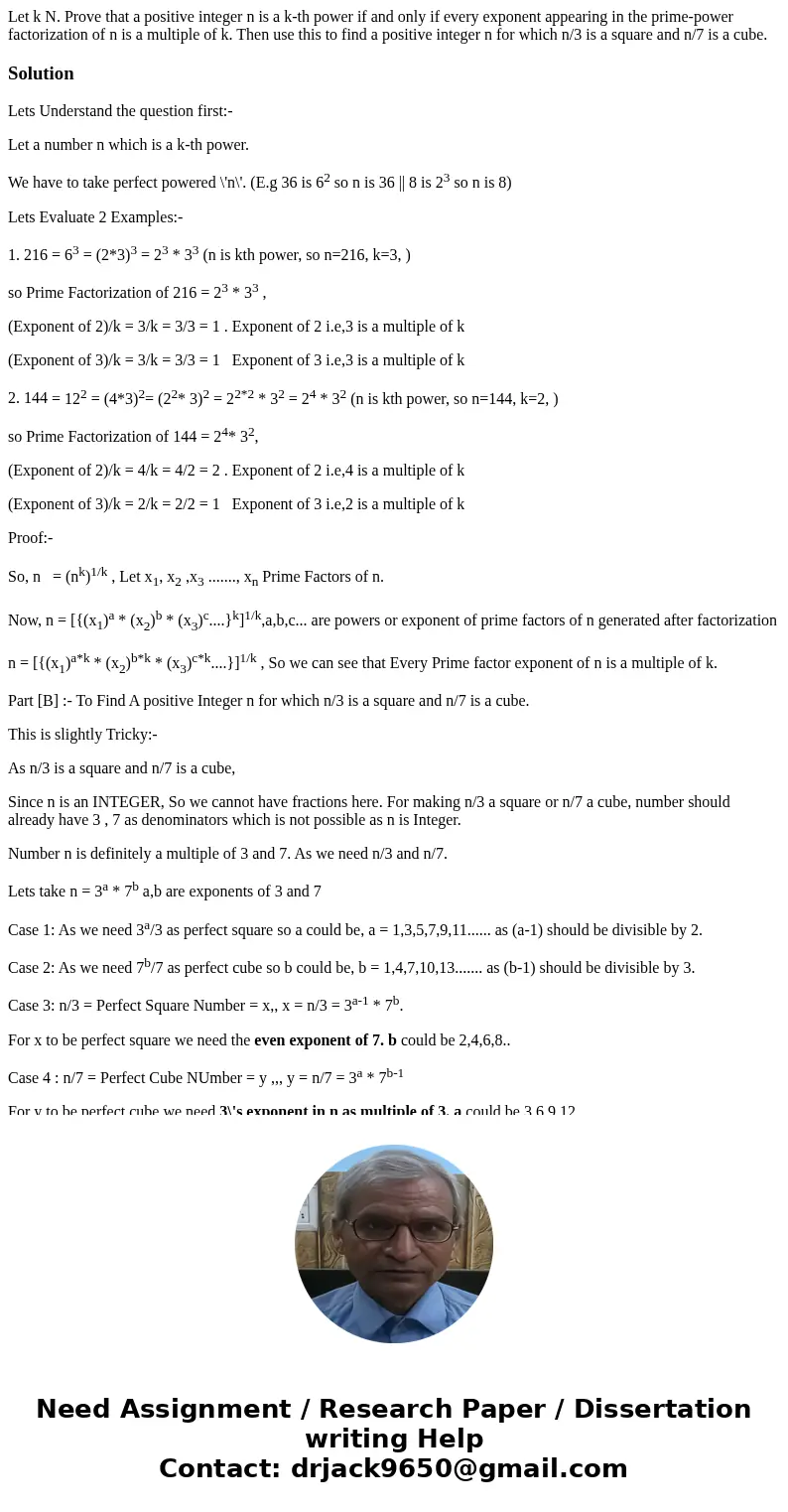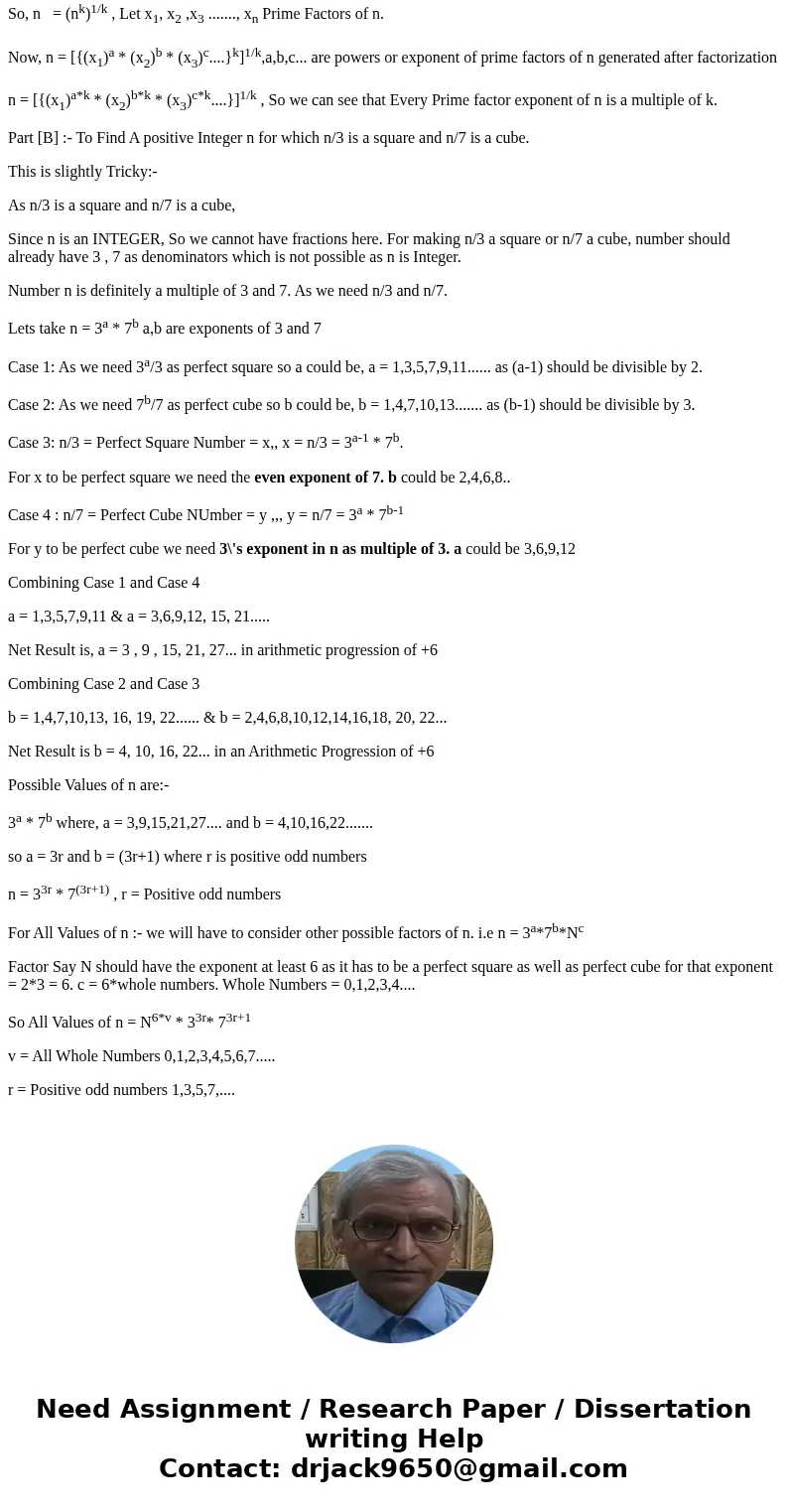Let k N Prove that a positive integer n is a kth power if an
Solution
Lets Understand the question first:-
Let a number n which is a k-th power.
We have to take perfect powered \'n\'. (E.g 36 is 62 so n is 36 || 8 is 23 so n is 8)
Lets Evaluate 2 Examples:-
1. 216 = 63 = (2*3)3 = 23 * 33 (n is kth power, so n=216, k=3, )
so Prime Factorization of 216 = 23 * 33 ,
(Exponent of 2)/k = 3/k = 3/3 = 1 . Exponent of 2 i.e,3 is a multiple of k
(Exponent of 3)/k = 3/k = 3/3 = 1 Exponent of 3 i.e,3 is a multiple of k
2. 144 = 122 = (4*3)2= (22* 3)2 = 22*2 * 32 = 24 * 32 (n is kth power, so n=144, k=2, )
so Prime Factorization of 144 = 24* 32,
(Exponent of 2)/k = 4/k = 4/2 = 2 . Exponent of 2 i.e,4 is a multiple of k
(Exponent of 3)/k = 2/k = 2/2 = 1 Exponent of 3 i.e,2 is a multiple of k
Proof:-
So, n = (nk)1/k , Let x1, x2 ,x3 ......., xn Prime Factors of n.
Now, n = [{(x1)a * (x2)b * (x3)c....}k]1/k,a,b,c... are powers or exponent of prime factors of n generated after factorization
n = [{(x1)a*k * (x2)b*k * (x3)c*k....}]1/k , So we can see that Every Prime factor exponent of n is a multiple of k.
Part [B] :- To Find A positive Integer n for which n/3 is a square and n/7 is a cube.
This is slightly Tricky:-
As n/3 is a square and n/7 is a cube,
Since n is an INTEGER, So we cannot have fractions here. For making n/3 a square or n/7 a cube, number should already have 3 , 7 as denominators which is not possible as n is Integer.
Number n is definitely a multiple of 3 and 7. As we need n/3 and n/7.
Lets take n = 3a * 7b a,b are exponents of 3 and 7
Case 1: As we need 3a/3 as perfect square so a could be, a = 1,3,5,7,9,11...... as (a-1) should be divisible by 2.
Case 2: As we need 7b/7 as perfect cube so b could be, b = 1,4,7,10,13....... as (b-1) should be divisible by 3.
Case 3: n/3 = Perfect Square Number = x,, x = n/3 = 3a-1 * 7b.
For x to be perfect square we need the even exponent of 7. b could be 2,4,6,8..
Case 4 : n/7 = Perfect Cube NUmber = y ,,, y = n/7 = 3a * 7b-1
For y to be perfect cube we need 3\'s exponent in n as multiple of 3. a could be 3,6,9,12
Combining Case 1 and Case 4
a = 1,3,5,7,9,11 & a = 3,6,9,12, 15, 21.....
Net Result is, a = 3 , 9 , 15, 21, 27... in arithmetic progression of +6
Combining Case 2 and Case 3
b = 1,4,7,10,13, 16, 19, 22...... & b = 2,4,6,8,10,12,14,16,18, 20, 22...
Net Result is b = 4, 10, 16, 22... in an Arithmetic Progression of +6
Possible Values of n are:-
3a * 7b where, a = 3,9,15,21,27.... and b = 4,10,16,22.......
so a = 3r and b = (3r+1) where r is positive odd numbers
n = 33r * 7(3r+1) , r = Positive odd numbers
For All Values of n :- we will have to consider other possible factors of n. i.e n = 3a*7b*Nc
Factor Say N should have the exponent at least 6 as it has to be a perfect square as well as perfect cube for that exponent = 2*3 = 6. c = 6*whole numbers. Whole Numbers = 0,1,2,3,4....
So All Values of n = N6*v * 33r* 73r+1
v = All Whole Numbers 0,1,2,3,4,5,6,7.....
r = Positive odd numbers 1,3,5,7,....


 Homework Sourse
Homework Sourse